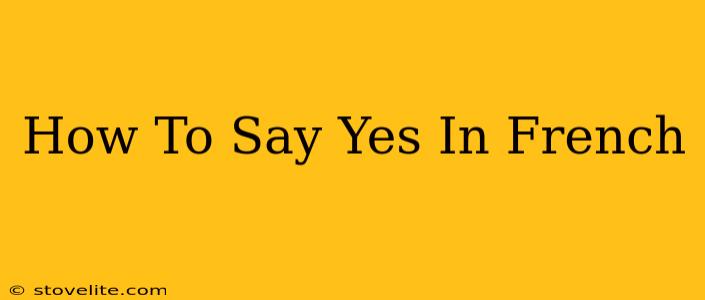Learning a new language can be exciting, and one of the first things you'll want to know is how to say "yes." In French, it's not as simple as a single word, as the context can influence which phrase is most appropriate. This guide will cover various ways to say "yes" in French, helping you navigate different conversational situations with confidence.
The Most Common Way to Say Yes in French: "Oui"
The most straightforward and commonly used way to say "yes" in French is "Oui" (pronounced "wee"). This works in almost all situations and is the perfect starting point for your French language journey. Use it as a general affirmative response to questions and statements.
Example Sentences:
-
Question: Parlez-vous anglais? (Do you speak English?)
-
Answer: Oui. (Yes.)
-
Statement: Il fait beau aujourd'hui. (It's beautiful weather today.)
-
Answer: Oui, c'est vrai. (Yes, that's true.)
More Formal Ways to Say Yes in French
While "Oui" is perfectly acceptable in most situations, sometimes a more formal response is needed. Here are a few alternatives:
"Certainement" (Certainly)
"Certainement" expresses a confident and affirmative "yes." It's a more formal and emphatic way of agreeing, suitable for professional settings or when speaking to someone older or in a position of authority.
"Absolument" (Absolutely)
Similar to "certainement," "absolument" ("ab-so-lu-mong") signifies a strong agreement. It's a more emphatic and enthusiastic way of saying "yes," suitable when you want to express strong approval or agreement.
"Bien sûr" (Of Course)
"Bien sûr" ("bee-an sure") translates to "of course" and is another polite and common way to say "yes" in French. It suggests that the request or statement is perfectly reasonable and easily fulfilled.
Informal Ways to Say Yes in French
For informal conversations with friends and family, you can use these more casual expressions:
"Ouais" (Yeah)
"Ouais" is the French equivalent of "yeah" or "yup." It's an informal and relaxed way to say "yes," suitable only for close friends and informal settings. Avoid using it in formal situations.
"Si" (Yes)
While primarily meaning "if," "Si" can also be used as a casual "yes," particularly in response to a question expecting a simple affirmation. However, using "Oui" is generally safer and clearer.
Choosing the Right "Yes" for the Occasion
The key to mastering French greetings is understanding the context. While "Oui" serves as a versatile response, employing other variations enriches your communication and demonstrates your grasp of the language's nuances. Consider your audience and the setting before choosing the most appropriate expression.
Practice Makes Perfect!
The best way to learn how to say "yes" in French—and any other phrase—is through practice. Engage in conversations, watch French movies and TV shows, and listen to French music to immerse yourself in the language and develop your fluency. With consistent effort, you'll become comfortable using these different expressions and confidently navigating French conversations.

